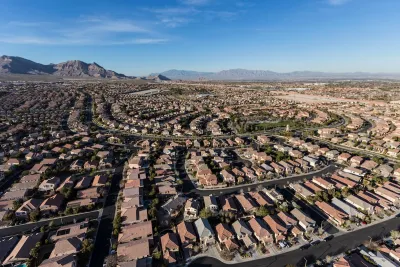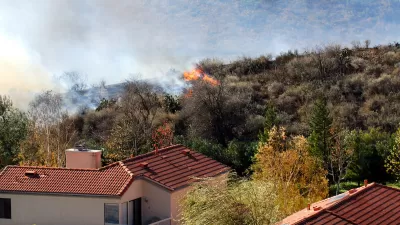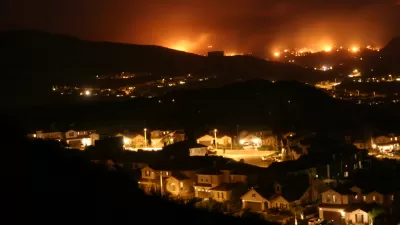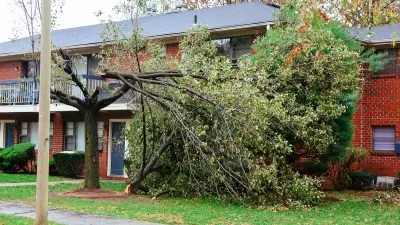Republican sponsor hopes the FAIR plan would be “a true market of last resort.”

This story is republished from Nevada Current. Written by April Corbin Girnus and Jeniffer Solis.
Thousands of homeowners in Nevada have seen their insurance policies canceled or not-renewed due to wildfire risk, prompting state lawmakers to warn that “a crisis is brewing” and considering ways to combat it.
Republican Assemblymember Jill Dickman from Washoe County believes Nevada should replicate a state-managed private insurance program already in place in 34 states and the District of Columbia.
Dickman is sponsoring Assembly Bill 437, which would establish a Fair Access to Insurance Requirements (FAIR) Plan – an insurance program of last resort for homeowners who cannot reasonably obtain coverage through standard insurance providers. Her bill is one of two bills making its way through the Nevada State Legislature focused on home insurance availability amid increasing wildfire risk.
FAIR plans, which have been around since the 1960s, provide coverage for homeowners who cannot find policies on the private market. The plans are managed by the state governments, but they are backed financially by a pool of the private insurers.
California’s FAIR plan has received the most public attention and criticism because of its size and the prevalence of wildfires in the state, but Dickman told the committee that Nevada’s FAIR program would not look like its western neighbor’s.
Dickman wants Nevada’s FAIR plan to remain “a true market of last resort” that does not compete with the private market. To ensure that, she has drafted a conceptual amendment specifying that homeowners be denied by three standard insurance companies before being eligible for Nevada FAIR. They must also attempt to secure non-FAIR coverage every two years.
Homeowners would also be required to undergo a wildfire risk assessment and implement its recommendations.
The Nevada Fire Chiefs Association worked with Dickman on AB437. Representatives from the group emphasized the need to mitigate fire risk.
Elko County Fire Chief Matthew Petersen estimated that once a week he receives a phone call from someone asking for help because their home insurance policy is getting canceled.
Dickman has also capped what FAIR will insure – $5 million for commercial properties and $750,000 for residential properties.
She acknowledged those limits are relatively low considering the cost of housing in many parts of the state. The median price of a home in Washoe County is currently around $550,000.
In 2023, 481 homeowners insurance policies were canceled or non-renewed due to wildfire risk — an 82% increase compared to the previous year, according to the Nevada Division of Insurance. That same year, nearly 5,000 applications for homeowners insurance were declined due to wildfire risk — a 104.8% increase over the previous year.
Cadence Matijevich, a lobbyist for Washoe County, said there is a misguided assumption that wildfire insurance is “an issue of the 1%” involving multimillion homes in Incline Village.
“That’s not true,” she said. “We’ve heard heartbreaking stories from senior citizens who’ve lived in homes for 50 years and are at risk of losing their homes because they couldn’t get property insurance.”
Risk in Nevada
Nearly one-fifth of Nevada’s land area has been burned by wildfire in the past 40 years, landing the state fifth in the nation for land area burned by wildfires.
A new study by the Lied Center for Real Estate at the University of Nevada, Las Vegas found that more than 18% of Nevada’s land mass has been torched by wildfire from 1984 through 2024.
Nevada’s fire season, once limited to late summer and early fall, now spans nearly the entire calendar year.
High wildfire risk makes areas less attractive for developers, impacting housing development, said the Lied Center’s Research Director, Nicholas Irwin. Rural areas, which already deal with high construction cost and other barriers to development, could be disproportionately impacted
As Dickman put it during the AB437 hearing: “You can’t sell a home you can’t insure.”
FULL STORY: Two bills seek to address growing issue of home insurance cancellations over wildfire risk

Alabama: Trump Terminates Settlements for Black Communities Harmed By Raw Sewage
Trump deemed the landmark civil rights agreement “illegal DEI and environmental justice policy.”

Planetizen Federal Action Tracker
A weekly monitor of how Trump’s orders and actions are impacting planners and planning in America.

The 120 Year Old Tiny Home Villages That Sheltered San Francisco’s Earthquake Refugees
More than a century ago, San Francisco mobilized to house thousands of residents displaced by the 1906 earthquake. Could their strategy offer a model for the present?

In Both Crashes and Crime, Public Transportation is Far Safer than Driving
Contrary to popular assumptions, public transportation has far lower crash and crime rates than automobile travel. For safer communities, improve and encourage transit travel.

Report: Zoning Reforms Should Complement Nashville’s Ambitious Transit Plan
Without reform, restrictive zoning codes will limit the impact of the city’s planned transit expansion and could exclude some of the residents who depend on transit the most.

Judge Orders Release of Frozen IRA, IIJA Funding
The decision is a victory for environmental groups who charged that freezing funds for critical infrastructure and disaster response programs caused “real and irreparable harm” to communities.
Urban Design for Planners 1: Software Tools
This six-course series explores essential urban design concepts using open source software and equips planners with the tools they need to participate fully in the urban design process.
Planning for Universal Design
Learn the tools for implementing Universal Design in planning regulations.
Clanton & Associates, Inc.
Jessamine County Fiscal Court
Institute for Housing and Urban Development Studies (IHS)
City of Grandview
Harvard GSD Executive Education
Toledo-Lucas County Plan Commissions
Salt Lake City
NYU Wagner Graduate School of Public Service





























